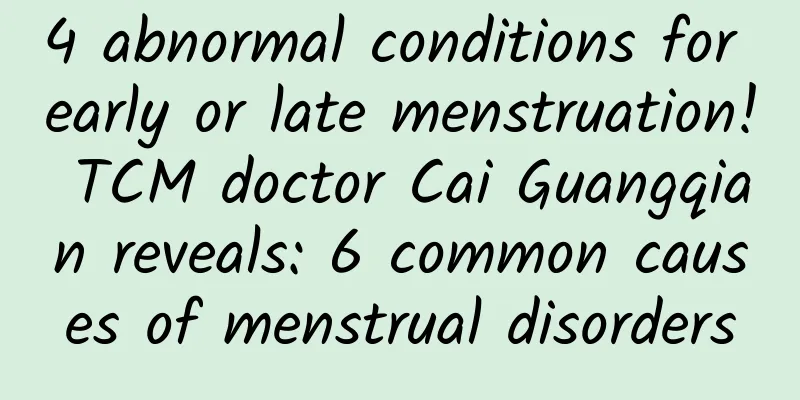4 abnormal conditions for early or late menstruation! TCM doctor Cai Guangqian reveals: 6 common causes of menstrual disorders

|
Due to high work pressure, staying up late, overwork, and irregular meals, women are most worried about menstrual disorders, such as early or late menstruation, heavy menstrual bleeding, or reduced menstrual flow. Chinese medicine practitioner Cai Guangqian said that menstrual disorders are usually caused by depression, tension, long-term fatigue, stress and other factors that cause endocrine disorders, resulting in dysfunction of the three internal organs: "liver, spleen, and kidney." If you want to improve menstrual disorders, in addition to medical treatment, it is recommended to start from the four stages of the menstrual period, combined with a suitable diet and regular exercise, so that the menstruation comes and goes smoothly every month. A menstrual cycle of 21 to 35 days is normalChinese medicine practitioner Cai Guangqian said that many female friends worry that their menstruation does not come at a fixed time every month, which means that their menstruation is irregular. In fact, only a few women have a menstrual cycle of exactly 28 days. A menstrual cycle between 21 and 35 days is considered normal. Occasionally, menstruation may be early or late, but it is also considered normal as long as it does not exceed 7 days. Generally speaking, the menstrual period lasts 3 to 7 days, and for most women it ends in about 5 days. Usually, the amount of menstrual blood will be heavier in the first 2 or 3 days of the menstrual period, and then gradually decrease. The total amount of menstrual blood during the entire period is about 10~80ml. Since the amount of menstrual flow is difficult to measure, it can generally be judged from the amount of sanitary napkins used. The normal range is 4 to 6 sanitary napkins used per day during the entire menstrual cycle. 6 common causes of menstrual disordersAccording to TCM physician Cai Guangqian, most of the causes of irregular menstruation include: 1. Changes in lifestyle habits: Many causes of irregular menstruation are caused by hormonal factors. Frequent insomnia, staying up late and other abnormal work and rest habits will affect hormone secretion and easily lead to menstrual disorders. 2. Bad mood: Many emotional problems, such as depression and tension, can lead to dysfunction of the liver's drainage function, affecting menstruation and ovulation. 3. High stress: Excessive stress will produce cortisol hormone, which will disrupt the interaction between the hypothalamus, pituitary gland, and ovaries, leading to menstrual disorders. 4. Too much fatigue: Long-term fatigue can damage the kidney qi, and abnormal diet or excessive thinking can damage the spleen qi. It can also affect the qi and blood of the Chong and Ren meridians, leading to irregular menstrual cycles. 5. Vigorous exercise: Vigorous exercise often causes fluctuations in hormones in the body, resulting in abnormal release of hormones in the hypothalamus of the brain and menstrual disorders. 6. Excessive weight loss: Excessive weight loss can lead to endocrine disorders and cause dysfunction of the liver, spleen, and kidneys, among which liver depression is the main cause. 4 major abnormalities of menstruationHowever, if the menstrual irregularity occurs within the first two years of menstruation or when approaching menopause, and if there are no other symptoms, it is normal and does not require treatment. The following are some of the common conditions of irregular menstruation and abnormal menstrual blood volume seen in outpatient clinics. 4 major conditions of abnormal menstruation. (Information provided by Dr. Cai Guangqian) Condition 1: Irregular menstrual cycle, early menstruation If the menstrual cycle is always more than 7 days early, or even occurs twice in 1 month, it is considered early menstruation. The causes of early menstruation may be corpus luteum insufficiency, pelvic inflammatory disease leading to uterine bleeding, or spleen or kidney deficiency, which causes the Chong and Ren meridians to be unable to control the blood in the body, resulting in abnormal bleeding. In addition, yang excess and yin deficiency (commonly known as hot temper) or liver depression can lead to too much energy in the blood and may also cause menstrual blood to rush out before the due time. Solution: Women who often have their periods early should eat more fresh fruits and vegetables, and less hot and heat-promoting foods such as chili peppers, garlic, cinnamon, coffee, pepper, lamb, and alcohol; they should also eat less crabs, hawthorns, peaches, brown sugar, and other foods that have a blood-activating effect. In addition, you should avoid staying up late, having too much mood swings, and not doing heavy labor or strenuous exercise before and during menstruation. If your period is delayed by 7 days for two consecutive cycles, or even only occurs once every two or three months, it is considered delayed menstruation. Condition 2: Irregular menstrual cycle, delayed menstruation If your period is delayed by 7 days for two consecutive cycles, or even only occurs once every two or three months, it is considered delayed menstruation. There are usually two reasons for delayed menstruation. The first is insufficient menstrual blood. For example, long-term illness or frequent sexual intercourse may damage the kidney qi, or picky eating or dieting may cause weak spleen and stomach function, resulting in insufficient menstrual blood and delayed menstruation. Another situation is that the discharge of menstrual blood is obstructed. For example, a love of eating ice, obesity or depression can cause blockage of evil qi and clog the menstrual channel, so the menstrual period will not come until the condition improves. Solution: Women whose menstruation is often late should avoid eating too much cold food, especially before and during menstruation. During menstruation, they should avoid catching cold, taking cold showers or getting caught in the rain. You can do the following massage to relieve the pain. Soothing massage: Rub your palms together to warm them up, then place them on both sides of your waist, and rub them diagonally back and forth toward the center of your lower abdomen, about 30 times at a time. It is best to rub until you feel a sore and warm feeling in the area. Condition 3: Regular menstrual cycle, but heavy menstrual flow If using 3 packs (30 pieces) of sanitary napkins during the entire menstrual cycle is still not enough, and you often feel dizzy and anemic, it means that you have too much menstrual bleeding. Possible causes include organic diseases such as uterine fibroids and endometriosis; it may also be related to factors such as contraceptives, contraceptive devices, or anovulation caused by endocrine abnormalities. From the perspective of traditional Chinese medicine, it is usually due to qi deficiency, blood heat or blood stasis, which causes damage to the Chong and Ren meridians, making it impossible to regulate the body's blood, resulting in excessive blood flowing out of the uterus. Solution: In normal times, do not excessively diet or be picky about food. Eat more foods that replenish qi and blood, such as whole grains, nuts, liver, black-bone chicken, lean meat, dark vegetables, egg yolks, kelp, black sesame, black fungus, soybeans, red dates, cherries, grapes, etc. In addition, it is also important to get adequate rest and avoid excessive thinking or fatigue. Condition 4: Regular menstrual cycle, but heavy menstrual flow If the amount of menstrual blood is significantly less than before, or the period ends in less than 2 days, it is oligomenorrhea. The cause of oligomenorrhea may be related to damage to the endometrium caused by uterine scraping, or endometrial atrophy caused by long-term use of contraceptives. From the perspective of traditional Chinese medicine, there are two main reasons. The first is that there is insufficient raw material, loss of essence and blood, resulting in insufficient Qi and blood in the Chong and Ren meridians, and no blood can be discharged. It may also be that there is enough raw material but the path is blocked. For example, the blood is easily coagulated and becomes blood stasis due to cold, resulting in poor blood flow in the Chong and Ren meridians, and the menstrual blood discharged is less than usual. Solution: Do not eat cold food one week before menstruation. During menstruation, you should keep warm and avoid cold food. Pay attention to rest, reduce fatigue, keep a happy mood, and try to avoid drastic mood swings. Follow these 5 principles for smooth menstruationGenerally speaking, for girls to have smooth menstruation, it is recommended to follow the following 5 principles: 1. Avoid staying up late, tension, stress, and emotional fluctuations. 2. Moderate exercise, such as jogging, Kegel exercises, or yoga. 3. Apply hot compress to your lower abdomen for at least 30 minutes every day; when menstruation comes, extend the hot compress to 1 hour. 4. Take a balanced diet and reduce the intake of raw, cold, spicy and irritating foods. 5. Do not take supplements on your own. Shenghua Tang and Siwu Tang are not suitable for everyone. Please consult a Chinese medicine practitioner first. |
Recommend
What are the early symptoms of uterine fibroids in women?
What are the early symptoms of uterine fibroids i...
Lose weight like lightning! 5 weight loss breakfasts you can’t miss
[Key Points]: In the new year, do you have any pl...
Can intrauterine adhesions be cured? There are many ways
Intrauterine adhesion refers to adhesion of the i...
What to eat to make uterine fibroids disappear What to eat to make uterine fibroids smaller
What to eat to make uterine fibroids disappear Wh...
Will I have constant stomach pain if I have an ectopic pregnancy? See what the doctor says
Ectopic pregnancy is a very common disease, which...
How to regulate irregular menstruation for women? Preventive measures for irregular menstruation for women
Once irregular menstruation occurs, female friend...
What should we pay attention to after abortion?
After undergoing abortion, patients need to pay a...
What foods can't patients with uterine fibroids eat?
What foods can't patients with uterine fibroi...
What are the causes of irregular menstruation in women?
It is not uncommon for women to have irregular me...
How many millimeters of pelvic fluid is normal?
Pelvic effusion causes dysfunction of internal or...
Men also suffer from osteoporosis but are not aware of it
According to statistics, about 500,000 people ove...
Are you under a lot of pressure and can't stop talking? 10 tips to control your appetite and lose weight easily
When people are under a lot of pressure and want ...
Can I drink chrysanthemum and cassia seed tea for cervical hypertrophy?
Cervical hypertrophy is a common gynecological pr...
What causes pelvic effusion? Know these and say goodbye to pelvic effusion
Speaking of pelvic effusion , I think all women w...
Can I still get pregnant after uterine fibroid surgery? How long will it take to get pregnant after uterine fibroid surgery?
Every woman wants to have her own child, but many...









